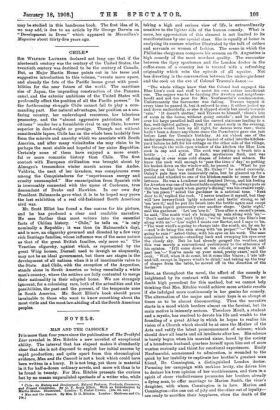CHILE.*
Sin WILFRID LAURIER declared not long ago that if the nineteenth century was the century of the United States, the twentieth century was destined to be the century of Canada. But, as Major Martin Hume points out in his terse and suggestive introduction to this 'volume, "events move apace, and already the fate of the Pacific looms great with possi- bilities for the near future of the world. The maritime rise of Japan, the impending construction of the Panama canal, and the exterior ambitions of the United States will profoundly affect the position of all the Pacific powers." In the forthcoming struggle Chile cannot fail to play a com- manding part. Her natural advantages, her position as a sea- faring country, her undeveloped resources, her laborious peasantry, and the "almost aggressive patriotism of her citizens" render her a formidable rival to any State, however superior in dead-weight or prestige. Though not without considerable lapses, Chile has on the whole been laudably free from the misrule and anarchy which we associate with South America, and after many vicissitudes she may claim to be perhaps the most stable and hopeful of her sister Republics. Certainly none of them have enjoyed a more event- ful or more romantic history than Chile. The first contact with European civilisation was brought about by Almagro's tremendous winter march across the Andes. Valdivia, the next of her invaders, was conspicuous even among the Conquistadores for "superhuman energy and cruelty unexampled." Her emancipation from Spanish rule is irrevocably connected with the name of Cochrane, true descendant of Drake and Hawkins. In our own day President Balmaceda gave what it is to be hoped may prove the last exhibition of a real old-fashioned South American civil war.
Mr. Scott Elliot has found a fine canvas for his picture, and he has produced a clear and readable narrative. He sees further than most writers into the essential facts of Chilian history. "Chile," he tells us, "is only nominally a Republic ; it was then (in Balmaceda's day), and is now, an oligarchy governed and directed by a few very rich Santiago families, whose influence was of the same nature as that of the great British families, only more so." The Venetian oligarchy, against which, as represented by the great Whig houses, Disraeli used to inveigh so eloquently, may not be an ideal government, but there are stages in the development of all nations when it is of inestimable value to the State. And Chile, with the exception of the Argentine, stands alone in South America as being essentially a white man's country, where the settlers are fully contented to merge their nationality in their adopted home. We are strangely ignorant, for a colonising race, both of the actualities and the possibilities, the past and the present, of the temperate zone in South America. Mr. Scott Elliot's book should prove invaluable to those who want to know something about the most virile and the most law-abiding of all the South American peoples.






































 Previous page
Previous page